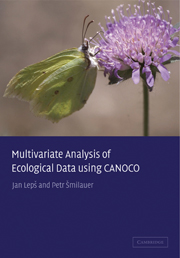Book contents
- Frontmatter
- Contents
- Preface
- 1 Introduction and data manipulation
- 2 Experimental design
- 3 Basics of gradient analysis
- 4 Using the Canoco for Windows 4.5 package
- 5 Constrained ordination and permutation tests
- 6 Similarity measures
- 7 Classification methods
- 8 Regression methods
- 9 Advanced use of ordination
- 10 Visualizing multivariate data
- 11 Case study 1: Variation in forest bird assemblages
- 12 Case study 2: Search for community composition patterns and their environmental correlates: vegetation of spring meadows
- 13 Case study 3: Separating the effects of explanatory variables
- 14 Case study 4: Evaluation of experiments in randomized complete blocks
- 15 Case study 5: Analysis of repeated observations of species composition from a factorial experiment
- 16 Case study 6: Hierarchical analysis of crayfish community variation
- 17 Case study 7: Differentiating two species and their hybrids with discriminant analysis
- Appendix A Sample datasets and projects
- Appendix B Vocabulary
- Appendix C Overview of available software
- References
- Index
9 - Advanced use of ordination
Published online by Cambridge University Press: 09 February 2010
- Frontmatter
- Contents
- Preface
- 1 Introduction and data manipulation
- 2 Experimental design
- 3 Basics of gradient analysis
- 4 Using the Canoco for Windows 4.5 package
- 5 Constrained ordination and permutation tests
- 6 Similarity measures
- 7 Classification methods
- 8 Regression methods
- 9 Advanced use of ordination
- 10 Visualizing multivariate data
- 11 Case study 1: Variation in forest bird assemblages
- 12 Case study 2: Search for community composition patterns and their environmental correlates: vegetation of spring meadows
- 13 Case study 3: Separating the effects of explanatory variables
- 14 Case study 4: Evaluation of experiments in randomized complete blocks
- 15 Case study 5: Analysis of repeated observations of species composition from a factorial experiment
- 16 Case study 6: Hierarchical analysis of crayfish community variation
- 17 Case study 7: Differentiating two species and their hybrids with discriminant analysis
- Appendix A Sample datasets and projects
- Appendix B Vocabulary
- Appendix C Overview of available software
- References
- Index
Summary
This chapter introduces four specialized or more advanced techniques, which build on the foundations of ordination methods and can be used with the Canoco for Windows package. All four methods are illustrated in one of the case studies presented in Chapters 11–17.
Testing the significance of individual constrained ordination axes
If you use several (partially) independent environmental variables in a constrained ordination, the analysis results in several constrained (canonical) ordination axes. In CANOCO, it is easy to test the effect of the first (most important) constrained axis or the effect of the whole set of constrained axes.
But you may be interested in reducing the set of constrained axes (the dimensionality of the canonical ordination space), and to do so you need to find how many canonical axes effectively contribute to the explanation of the response variables (to the explanation of community variation, typically). To do so, you must test the effects of individual constrained axes. Their independent (marginal) effects do not differ from their additional (conditional) effects, of course, because they are mutually linearly independent by their definition.
Let us start with the simplest situation, when you have a constrained ordination (RDA or CCA) with no covariables. If you need to test the significance of a second (or higher) canonical axis for such constrained analysis, you should clone the corresponding CANOCO project, i.e. create a new project, similar to the original one but containing, in addition, covariable data. You will use the scores of the samples on the constrained axes, which were calculated in the original project.
- Type
- Chapter
- Information
- Multivariate Analysis of Ecological Data using CANOCO , pp. 140 - 148Publisher: Cambridge University PressPrint publication year: 2003
- 1
- Cited by



